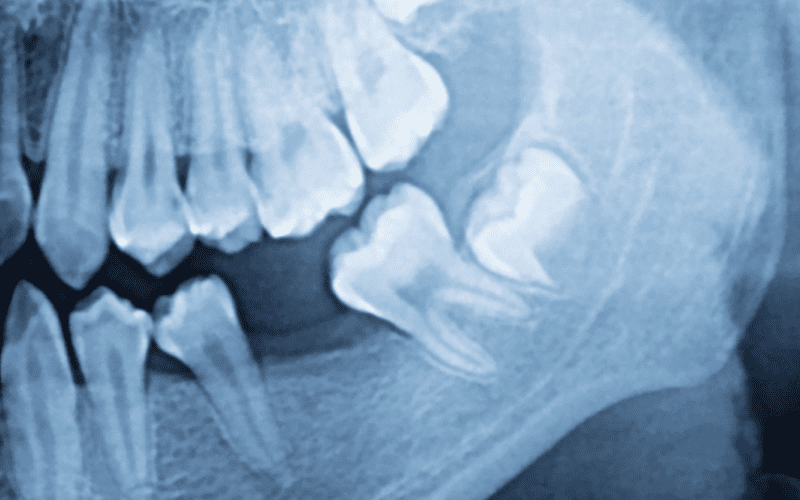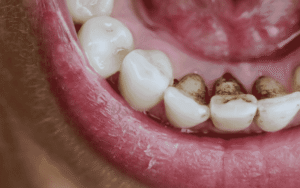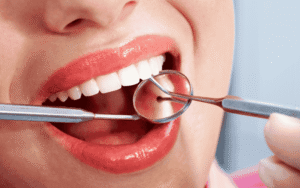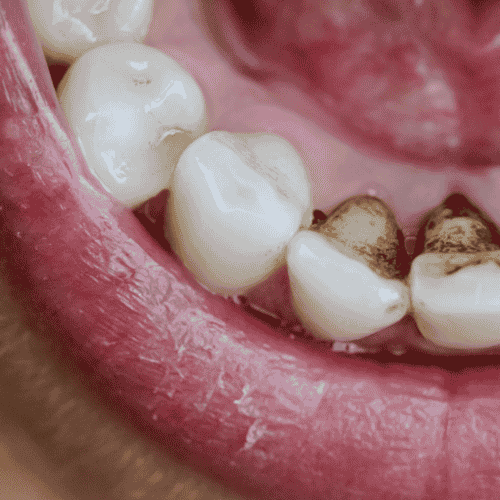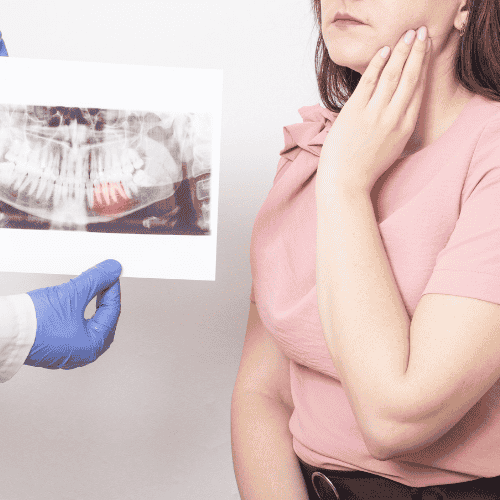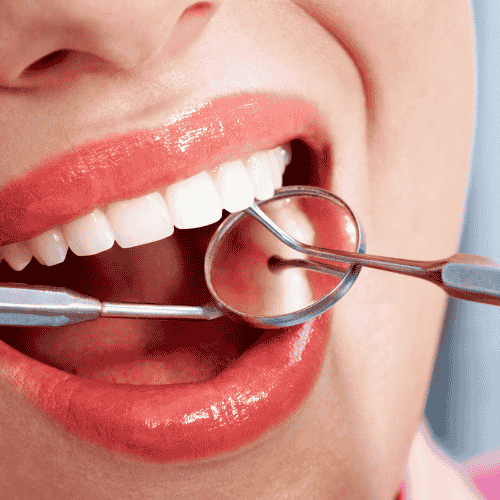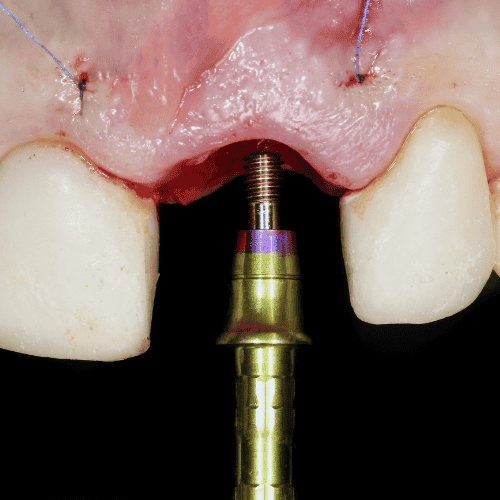Wisdom teeth usually appear in late teens or early 20s. However, some can get them at 17, while others wait until 25 or later.
Most individuals get their wisdom teeth between 17 and 21, but not always. Some people wait until their mid-20s to get their third molars. Understand that genetics and jaw size affect wisdom teeth eruption date.
Don’t worry if these teeth don’t emerge in your late teens; it’s normal! Everyone’s timeline is different when it comes to what age do wisdom teeth come in or when does your wisdom teeth come in.
What Are Wisdom Teeth and Why Do We Have Them?
Wisdom teeth, or third molars, arrive last in your late teens or early twenties. Our ancestors used these teeth to chew and crush harder food, particularly when their jaws were bigger and could fit all the molars.
As humans evolved, our jaws shrank, leaving less room for these last teeth. Wisdom teeth are deemed vestigial because they no longer perform their vital role. They’re still part of our normal dental growth, but restricted mouth space might cause problems for many individuals. Many also ask why do wisdom teeth exist and do everyone have wisdom teeth because not everyone develops them.
Average Age Range for Wisdom Teeth Eruption
Many late-blooming third molars burst through the gums between 17 and 21. Don’t worry if they don’t come in right away; many people get wisdom teeth in their mid-20s or later.
Wisdom teeth usually come later than anticipated, so don’t panic if you’re older. Each person develops differently, and wisdom teeth often appear after the early twenties. It’s common to question what age do your wisdom teeth come in or at what age do wisdom teeth come in depending on genetics.
Early Signs Your Wisdom Teeth Are Coming In
Several signs indicate wisdom tooth emergence. As these last teeth push through the gums, some people may feel a variety of pain.
Here are some early symptoms of wisdom teeth emergence:
- Pain and Discomfort: Rear of mouth ache or throbbing feeling may occur, especially while eating or expanding mouth wide.
- Visible Changes in Gums: You may experience visible changes in your gums near the region where your wisdom teeth are coming in, such as swelling, tenderness, or inflammation. The tips of your wisdom teeth may poke through the gums as white patches.
- Swelling Around the Jaw or Gums: Swelling in the jaw or gums may develop when teeth progress to the surface.
- Difficulty Moving Your Jaw: Jaw stiffness or pain when eating or talking may indicate wisdom teeth emergence.
Keep an eye on these symptoms and see your dentist. Early management may avoid wisdom tooth issues and discomfort. These are the first signs of wisdom teeth coming in and help you know how to tell if wisdom teeth are coming in or how to know if wisdom teeth are coming in.
Common Symptoms of Erupting Wisdom Teeth
There are various symptoms of wisdom teeth coming in. Detecting these symptoms early may help you manage pain and prevent consequences.
Check for these typical symptoms:
- Jaw Pain: If the back of your jaw hurts or aches, it could be a sign that your wisdom teeth are coming in. As teeth come in, this pain may happen more often and be stronger.
- Tender or Swollen Gums: It’s common for gums to hurt when wisdom teeth come in. It might hurt to chew or bite if your gums are tender, red, or swollen.
- Difficulty Opening Mouth: Wisdom teeth that are coming in may cause swelling or pressure, which makes it hard to move the jaw and open the mouth. This pain could make it hard to eat and talk.
- Unpleasant Taste or Smell: When wisdom teeth start to come in, they can create pockets in the gums where food particles and germs can gather. This can make things taste or smell bad. This could make your breath and taste bad.
- Crowding or Shifting Teeth: Moving wisdom teeth can cause teeth that are next to them to move or become misaligned. This could change the way your teeth fit together and make braces necessary.
If you have any of these symptoms, go to the dentist to see how your wisdom teeth are growing.
How Long Does Wisdom Tooth Pain Usually Last?
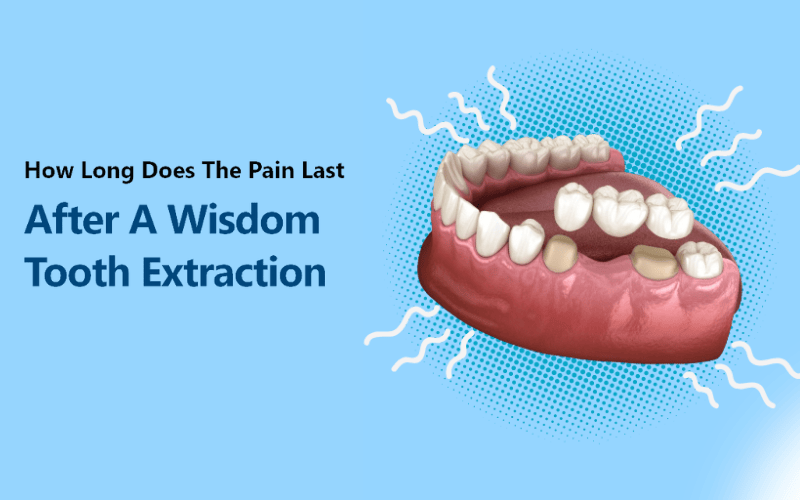
The length and severity of wisdom tooth discomfort varies greatly. Some have difficulty for days or weeks, while others experience it for months.
Some feel strong, searing pain, while others feel slight discomfort. Understand that this is typical during an eruption, but don’t dismiss it if it lasts or becomes worse.
Visit your dentist to decide the best treatment for wisdom tooth discomfort. They can ease your pain and provide oral health treatments. Many people also wonder how long does it take for wisdom teeth to come in when experiencing discomfort.
If you have any of these symptoms, see your dentist to check your wisdom teeth’s growth. These are often how do you know your wisdom teeth are coming in and how do I know if my wisdom teeth are coming in.
Factors That Can Affect Wisdom Teeth Growth and Timing
Here are the multiple factors affecting wisdom teeth eruption date:
- Genetics: Wisdom teeth may appear later in your family if your parents or siblings did.
- Jaw Size: Smaller jaws may delay wisdom teeth eruption owing to restricted development room.
- Overall Dental Development: Wisdom teeth may come later if other adult teeth did not grow on time.
Wisdom teeth eruption is typical in a wide range. If yours hasn’t arrived by your late teens or early twenties, don’t worry; they’re simply elegantly late! People often ask when does wisdom teeth come in or what age does wisdom teeth come in because timing varies for each person.
How Early Can Wisdom Teeth Be Seen on a Dental X-Ray?
Dental X-rays may reveal wisdom teeth growth at 10-12 years old. A panoramic X-ray may show wisdom tooth buds at this time.
Dentists use X-rays to inspect wisdom teeth. These scans measure tooth size, location, and angle before erupting. Dental professionals may anticipate wisdom tooth growth using panoramic or periapical X-rays. Detecting issues early allows for proactive treatment and eruption planning. This helps identify how to know if your wisdom teeth are coming in or when do your wisdom teeth come in.
Possible Complications When Wisdom Teeth Come In
Some wisdom teeth develop without problems, while others may need treatment. These issues usually result from limited mouth space for tooth growth. Here are some frequent issues:
Impacted Wisdom Teeth
Impaction, when wisdom teeth can’t completely erupt, is a typical issue. They might become caught under the gums or develop at strange angles. Impacted teeth may cause discomfort, oedema, infection, and misaligned teeth. Dentists can help you know how do you know if your wisdom tooth is coming in or if it’s impacted.
Partial Eruption and Crowding
Even partial wisdom tooth eruption might cause problems. When teeth partly erupt from the gums, they are hard to clean, increasing tooth decay and gum disease risk. Crowding from partly erupted wisdom teeth may also damage orthodontic treatment.
Increased Risk of Tooth Decay and Gum Disease
Wisdom teeth are far back in the mouth, making cleaning difficult. Food and germs trapped behind teeth may cause cavities, infections, and gum disease. Wisdom tooth gum inflammation and infection may cause discomfort and swelling. Untreated, this might cause bone loss. Preventing these issues requires regular dental examinations and proper oral hygiene.
Reasons for Extracting Wisdom Teeth
A dentist might suggest removing wisdom teeth for numerous reasons. Most prevalent reasons:
Preventive Measures
Overcrowding may result from wisdom teeth not having enough space to develop. This may lead to plaque, tooth decay, and gum disease, so remove them early.
Impaction
Wisdom teeth that cannot break through the gums may cause pain, swelling, and infection. Impacted wisdom teeth may be removed to alleviate discomfort and prevent dental complications.
Infection Risks
According to the British Journal of General Practice, leaving impacted wisdom teeth may raise the risk of pericoronitis, a tissue infection around a partly emerging tooth. Damage to neighbouring tooth roots might cause tumours in rare circumstances. Many patients ask do I need my wisdom teeth removed when facing such complications.
How Wisdom Teeth Are Extracted
Wisdom tooth position determines extraction.
- Simple Extractions: For simple extractions, dentists may use special tools to pull teeth right above the gum line.
- Surgical Extractions: A small cut in the gum is needed to completely remove wisdom teeth that are impacted or only partially erupted.
Follow your dentist’s instructions for removal to avoid problems and keep your teeth healthy.
When Should You See a Dentist or Oral Surgeon?
Knowing when to see a dentist or oral surgeon regarding wisdom teeth is vital for oral health. Check for these indicators to make an appointment:
Regular Dental Check-Ups
First, have regular dental checkups. Your dentist will monitor wisdom tooth growth in your late teens and early 20s for problems. Regular checkups enable your dentist to alert you if you require wisdom teeth removal.
Signs You May Need Wisdom Teeth Removed
Even if you go to the dentist often, there are some signs that you might need to have a tooth pulled:
- Pain or discomfort that lasts a long time in the back of your mouth.
- Pain or swelling around wisdom teeth
- Hard to open mouth or chewing that hurts
- Have bad breath or a bad taste all the time.
- Tooth damage or movement that is easy to see.
Contact your dentist immediately if any of these symptoms occur. They can decide whether wisdom teeth extraction is needed. Many people wonder are my wisdom teeth coming in when experiencing these signs wisdom teeth are coming in.
Referral to an Oral Surgeon
If your wisdom teeth are impacted or the extraction is considered to be complicated, your dentist may send you to an oral surgeon. Expert oral surgeons remove wisdom teeth safely and comfortably, minimising healing time.
Why It’s Important to Monitor Wisdom Teeth Development
Even if your wisdom teeth are coming in normally, you should continue to monitor their growth. Regular dental visits may detect issues early and avoid consequences. Why you should monitor your wisdom teeth:
Preventing Future Dental Issues
Prevention of dental issues is one reason to check wisdom teeth. Maybe your wisdom teeth aren’t bothering you now, but they may change. Early detection allows your dentist to remove teeth before they cause harm or other problems.
Protecting Neighboring Teeth
When wisdom teeth mature, they may press neighbouring teeth, causing alignment issues or damage. Dental exams and X-rays spot such concerns early. This allows your dentist to remove wisdom teeth or recommend other oral health procedures.
Maintaining Overall Oral Health
Maintaining oral health needs wisdom tooth monitoring. Wisdom teeth are at the back of your mouth, making cleaning harder. Gum disease, decay, and other dental issues may develop. Wisdom teeth should be checked regularly by your dentist to avoid long-term complications.
Consultation and Next Steps for Wisdom Teeth Evaluation
Since most people will get wisdom teeth, extractions are common. Consult a general dentist to learn how this technique works and whether extraction is needed.
Working with a dentist may help you understand when and how to remove wisdom teeth. Wisdom teeth should be checked, X-rayed, and evaluated often to avoid future issues.
Contact your dentist soon if you have wisdom tooth pain or concerns. They will help you through the assessment, answer your concerns, and propose the best oral health treatment. This ensures you know how to know if my wisdom teeth are coming in and how do you know wisdom teeth are coming in.
FAQs
Does everyone get wisdom teeth?
Wisdom teeth are usually present, although genetics may prevent them. About 35% of individuals may be born without them.
Can wisdom teeth come in straight?
Though rare, wisdom teeth might come in straight. Limited space can cause wisdom teeth to develop at an angle or get impacted. Dental examinations and X-rays may track their development and identify alignment difficulties early.
At what age do wisdom teeth usually come in?
Wisdom teeth usually appear between 17 and 21. They may occur earlier or later depending on development.
What happens if my wisdom teeth don't come in?
If your wisdom teeth don’t appear by your early 20s, they may stay impacted or never develop. This is normally harmless until it causes pain or illness.
How do I know if my wisdom teeth are impacted?
When wisdom teeth fail to burst through the gums, they are impacted. Back of the mouth soreness, swelling, or tenderness may occur. X-rays are excellent for confirming impact.
Do wisdom teeth always need to be removed?
Not always. If wisdom teeth grow in without discomfort, infection, or alignment difficulties, they may not require removal. The dentist can evaluate whether extraction is needed during regular visits.
What are the risks of keeping wisdom teeth in if they’re impacted?
Impacted wisdom teeth may cause infection, tooth damage, and cysts if ignored. They may also promote gum disease or tooth decay owing to improper cleaning. To check risks, go to the dentist regularly.



